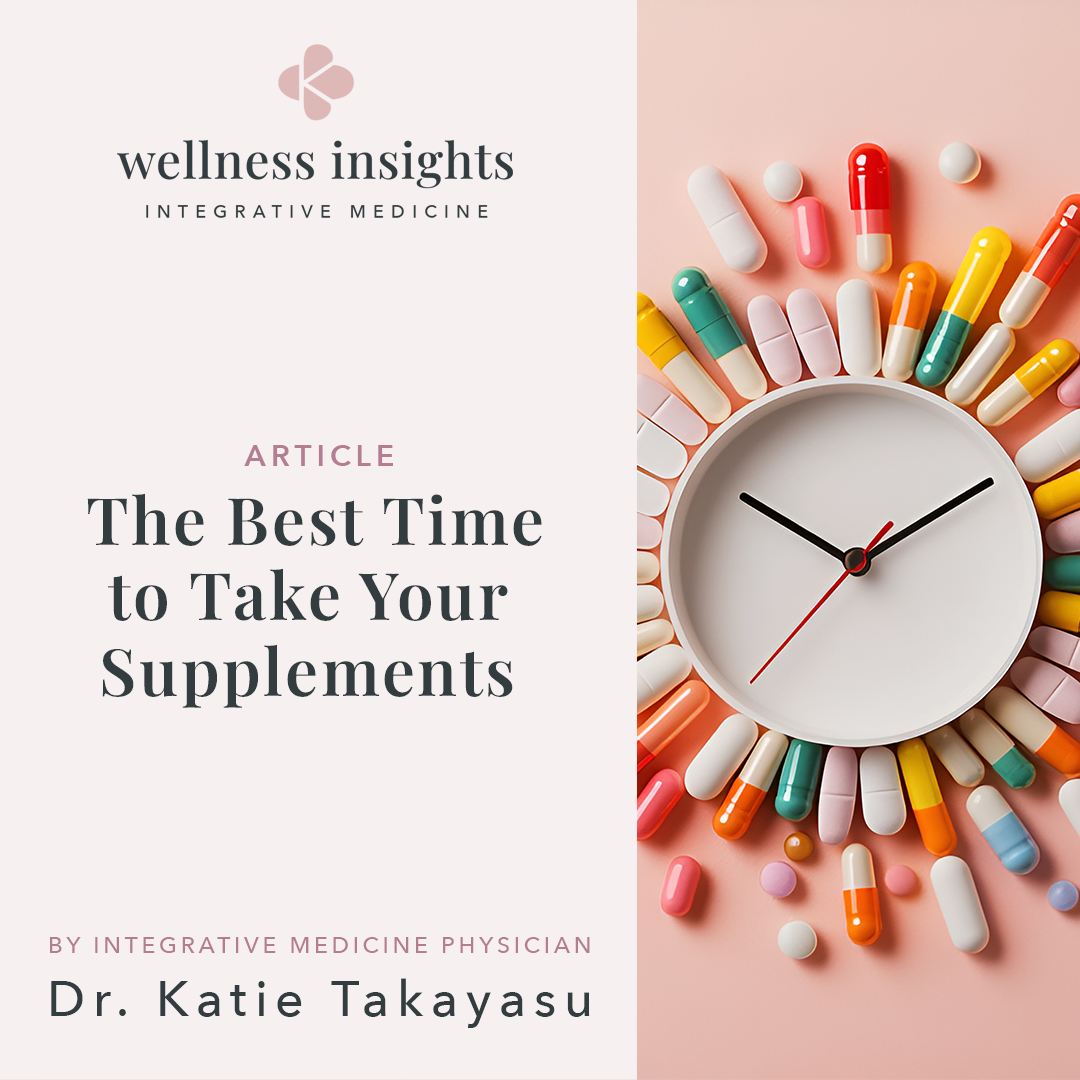The Best Time to Take Your Supplements: A Guide for Supporting Your Body’s Natural Rhythm
In integrative medicine, we look at the whole picture—how your body, mind, and environment work together. One small but powerful way to support wellness is through timing your supplements to match your body’s natural rhythms.
Our circadian clock—our internal 24-hour cycle—guides everything from hormone release to digestion. Taking certain supplements at the right time can improve absorption, reduce side effects, enhance exercise training, and optimize your body’s response.
Here’s how I recommend approaching some of the most common supplements:
Morning: Start Your Day with Energy and Nutrients
Amino acids: Supports muscle protein synthesis. Best taken on an empty stomach at least 30 minutes before a meal for best absorption.
Multivitamins & B-complex: These nutrients support energy and metabolism. Take them with breakfast to help kickstart your day. Avoid B-complex late in the day, as it may interfere with sleep. Recent research from Brigham & Women / Mass General shows the use of a daily multivitamin significantly benefits cognition and episodic memory.
Vitamin C: Supports immune function and energy. Pair it with your morning meal for steady absorption.
Vitamin D: Fat-soluble vitamins like vitamin D are better absorbed with dietary fat. Consider including eggs, avocado, or nuts with your morning dose. The recent VITAL trial was one of the first to connect vitamin D with longevity by preserving telomeres (the caps of our DNA). This study also supported the connection of vitamin D to anti-inflammatory effects and lowering risk of select chronic disease, like advanced cancer and autoimmune conditions.
Iron: Best taken with vitamin C to enhance absorption. Avoid pairing with calcium-rich foods.
Probiotics: Take 30 minutes before or with breakfast to help seed your gut with beneficial bacteria.
Midday: Support Heart, Brain, and Cellular Health
Omega-3s & CoQ10: These fat-soluble nutrients are best absorbed with lunch containing healthy fats. The VITAL trial mentioned above found a significant 28% reduction in risk of heart attack in those taking omega-3 fatty acid supplements.
Zinc: Important for immunity and metabolism. Take away from calcium or iron to optimize absorption.
Evening: Relax, Restore, and Support Sleep
Magnesium: Supports relaxation and restorative sleep. A recent study showed that supplementation with magnesium glycinate improves insomnia by affecting sleep efficiency, sleep onset time, and reduces early morning awakening as well as improves serum cortisol in older adults.
Calcium: Helps maintain bone health and may aid in winding down for the evening.
Melatonin: Supports sleep quality if traveling or doing shift work; best used as part of a bedtime routine about 2 hours before bedtime.
Calming Adaptogens (Ashwagandha, L-theanine, Phosphatidylserine): Can help manage stress and prepare your body for restorative sleep.
Why Timing Matters
Integrative medicine isn’t just about what supplements you take—it’s about when and how you take them. By aligning supplements with your natural rhythms, you support your body’s innate healing processes. This approach maximizes the benefits of each nutrient while honoring the holistic connection between lifestyle, nutrition, and wellness.
Ultimately, supplements are most effective when paired with consistent sleep, balanced meals, and mindful routines. Remember, you can’t supplement your way into good health. By approaching supplementation with intention, you can help your body thrive from morning energy to evening restoration.
This blog and website do not provide medical advice. It is intended for general informational purposes only and does not address individual circumstances. It is not a substitute for professional medical advice, diagnosis or treatment and should not be relied on to make decisions about your health. Always check with your own healthcare provider before taking a new supplement and before making any significant diet, lifestyle, exercise or other changes. Never ignore professional medical advice in seeking treatment because of something you have read on this site. If you think you may have a medical emergency, immediately call your doctor or dial 911.

